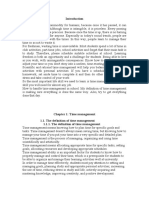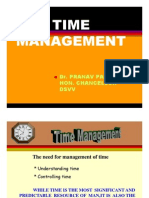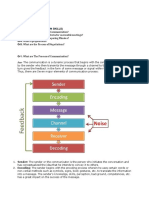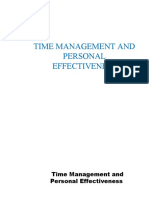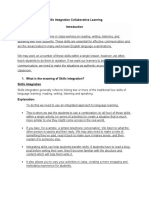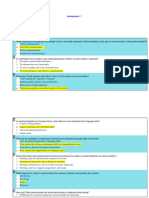Professional Documents
Culture Documents
XSTD
XSTD
Uploaded by
Yojit Chavhan0 ratings0% found this document useful (0 votes)
9 views2 pagesTime management is the process of organizing and planning how to allocate time between different activities. Procrastination, which is the practice of postponing tasks, is an unproductive habit that should be avoided. Common areas of time waste include trying to do multiple tasks at once, beginning tasks without planning, interruptions like phone calls, and disorganization. Effective communication involves clearly exchanging thoughts and information so that the message is understood as intended. It is an active process that requires listening with an open mind to develop understanding and strengthen relationships.
Original Description:
Hdjdjdcmmxs,
Original Title
xstd
Copyright
© © All Rights Reserved
Available Formats
PDF, TXT or read online from Scribd
Share this document
Did you find this document useful?
Is this content inappropriate?
Report this DocumentTime management is the process of organizing and planning how to allocate time between different activities. Procrastination, which is the practice of postponing tasks, is an unproductive habit that should be avoided. Common areas of time waste include trying to do multiple tasks at once, beginning tasks without planning, interruptions like phone calls, and disorganization. Effective communication involves clearly exchanging thoughts and information so that the message is understood as intended. It is an active process that requires listening with an open mind to develop understanding and strengthen relationships.
Copyright:
© All Rights Reserved
Available Formats
Download as PDF, TXT or read online from Scribd
Download as pdf or txt
0 ratings0% found this document useful (0 votes)
9 views2 pagesXSTD
XSTD
Uploaded by
Yojit ChavhanTime management is the process of organizing and planning how to allocate time between different activities. Procrastination, which is the practice of postponing tasks, is an unproductive habit that should be avoided. Common areas of time waste include trying to do multiple tasks at once, beginning tasks without planning, interruptions like phone calls, and disorganization. Effective communication involves clearly exchanging thoughts and information so that the message is understood as intended. It is an active process that requires listening with an open mind to develop understanding and strengthen relationships.
Copyright:
© All Rights Reserved
Available Formats
Download as PDF, TXT or read online from Scribd
Download as pdf or txt
You are on page 1of 2
MANAGEMENT OF TIME
QUESTIONS
1. What is time management?
Ans) Time management is the process of organizing and planning how to drive our time between
different activities.
2. Why is procrastination not a good practice?
Ans) Procrastination is the most common problem in time management. It is the practice of
postposing one thing or the other. It is an dangerous habit and should be avoided as it can leave a
feeling of unproductiveness, laziness and ineffectual.
3. List some common areas of time wastage.
• Trying to do several things at one point can spoil all the work.
• Beginning the task/work without prior planning or proper consideration can bungle
the whole thing causing wastage of time.
• Frequent interruptions such as telephone calls, doorbell, etc. can cause wastage of
time.
• When things are not properly organised a lot of time is wasted is searching the
misplaced items.
• Regretting and brooding over failures is wastage of time.
4. One must learn to say ‘NO’, Give reason
Ans) learning to say No is very important as it brings many benefits as it eventually reduce stress
and strengthen relationships. Trying to please everyone is the surest formula for failure.
5. What are time management skill?
• Creating and maintaining schedules of upcoming tasks and events.
• Prioritizing high-importance tasks over low-importance ones
• Planning out our day to make sure you dedicate the right amount of time to each
activity.
6. How to improve time management skill?
• Keep a planner
• Set timer.
• Set short-term and long-term goals
• Use your energy wisely
COMMUNICATE EFFECTIVELY
1. What is effective communication?
Ans) effective communication is the process of exchanging of thought, opinion, knowledge
and the data so that the message is received and understood with clarity and purpose.
2. Why is listening said to be an active process?
Ans) listening is an active process in which a conscious decision is made to listen to
and understand the message of the speaker. It is a process of using our ears, our eyes
and our brain to seek out the meaning and the feeling behind a person’s words.
3. List the four important components of communication?
Ans) the four components of good communication are the transmitter, message,
medium and the receiver. Where the transmitter is the sender or the originator of
the information or thought, the message is the information sent by the transmitter,
the medium is the modus of communicating through words, written, telephone etc.
the recipient is the receiver to whom the message is sent.
4. Effective communication helps to develop good relations. Give reason?
Ans) Assumption and prejudice reduce the effectiveness of communication. One
should listen with open mind without being too rigid. No misunderstanding between
the transmitter and the receiver. Good communication demands an interchange of
thought information to bring about better natural understanding, confidence and
good relation.
You might also like
- Com 101.lecture NotesDocument69 pagesCom 101.lecture NotesNJUGO MCHUNJUGO100% (1)
- Cortes Module About CommunictaionDocument8 pagesCortes Module About CommunictaionMarichou BarongNo ratings yet
- Classroom Management: James H. Stronge " Qualities of Effective Teachers" (2002)Document7 pagesClassroom Management: James H. Stronge " Qualities of Effective Teachers" (2002)mlserquiniaNo ratings yet
- Communication and Time ManagementDocument31 pagesCommunication and Time ManagementTheophilus DomobiyoNo ratings yet
- Unit 2 MarketingDocument32 pagesUnit 2 Marketingshubham kumarNo ratings yet
- Class Notes Dcs 2 ShsDocument11 pagesClass Notes Dcs 2 ShsPATEL PURVIKUMARINo ratings yet
- Quản lý thời gianDocument3 pagesQuản lý thời giandương nguyễn thuỳNo ratings yet
- Week 5 Work 3.1-3.2Document14 pagesWeek 5 Work 3.1-3.2Lolita YuldaschewaNo ratings yet
- Kinshuk AslDocument5 pagesKinshuk Aslkinshuk mahajanNo ratings yet
- Christian Living Module 13 Week 13Document2 pagesChristian Living Module 13 Week 13Jomar FunoNo ratings yet
- Com 101.lecture Notes PDFDocument86 pagesCom 101.lecture Notes PDFclarakessy00No ratings yet
- Assignment PomDocument12 pagesAssignment PomDivisha AgarwalNo ratings yet
- Chapter 2Document11 pagesChapter 2Aleema RokaiyaNo ratings yet
- Oral Communication - PowerpointDocument6 pagesOral Communication - PowerpointAgang Nicole BakwenaNo ratings yet
- Reflection On WATCHDocument3 pagesReflection On WATCHKRISTEL JOY MANCERANo ratings yet
- Office System Wps OfficeDocument41 pagesOffice System Wps OfficeAlvin Dimasacat SaetNo ratings yet
- Oral Communication - Meaning, Advantages and LimitationsDocument15 pagesOral Communication - Meaning, Advantages and LimitationsRajat PawanNo ratings yet
- Action Points ATIDocument3 pagesAction Points ATISuzette AbejuelaNo ratings yet
- Time Management PGD (Eco & Fin)Document10 pagesTime Management PGD (Eco & Fin)uswyne100% (1)
- Time ManagementDocument46 pagesTime ManagementAWGP Youthcell MP100% (1)
- The Fundamentals of ListeningDocument3 pagesThe Fundamentals of ListeningMark PitNo ratings yet
- UntitledDocument16 pagesUntitledAman KumarNo ratings yet
- BC KMBN 107 Unit 2 NotesDocument26 pagesBC KMBN 107 Unit 2 NotesRizwan SaifiNo ratings yet
- The Art of Listening: BCRW Mba/Mcs/Bba ILM Colleges KhanpurDocument8 pagesThe Art of Listening: BCRW Mba/Mcs/Bba ILM Colleges KhanpurJahanzab AbbasiNo ratings yet
- Time ManagementDocument8 pagesTime ManagementLouie F. Ramirez IINo ratings yet
- Case StudyDocument8 pagesCase StudyEngr Fahimuddin QureshiNo ratings yet
- WELLNE$SS MASSAGE Fact Sheets For Grade 10Document2 pagesWELLNE$SS MASSAGE Fact Sheets For Grade 10Christine De San Jose50% (2)
- Effective CommunicationDocument47 pagesEffective Communicationssuman2742No ratings yet
- SEC 1 Communication Skills NotesDocument5 pagesSEC 1 Communication Skills Notesknowledgezone8242No ratings yet
- Time Management: Ariel M. Ortuoste, RNDocument61 pagesTime Management: Ariel M. Ortuoste, RNarielortuosteNo ratings yet
- Evropski Univerziet BrčkoDocument12 pagesEvropski Univerziet BrčkojaskalilaedisNo ratings yet
- Enhancing Soft Skill Note Week 2Document17 pagesEnhancing Soft Skill Note Week 2ashishsingh.hb181No ratings yet
- Mca 104 (Communication Skills) Q-1. Q-2. Q-3. Q-4. Q-5Document10 pagesMca 104 (Communication Skills) Q-1. Q-2. Q-3. Q-4. Q-5logicballiaNo ratings yet
- Self-Diagnosis Table: Total Number of AnswersDocument3 pagesSelf-Diagnosis Table: Total Number of AnswersJavier Irigoyen RodriguezNo ratings yet
- Communication SkillsDocument50 pagesCommunication SkillsdayestoNo ratings yet
- Time and Work Stress ManagementDocument10 pagesTime and Work Stress ManagementPallavi PalluNo ratings yet
- Personal and Professional GrowthDocument3 pagesPersonal and Professional GrowthSyed Moaz HussainNo ratings yet
- Mba 101Document7 pagesMba 101Sudesh UpadhyayNo ratings yet
- TimeDocument15 pagesTimeHarneet Singh LadianNo ratings yet
- Project On Time ManagementDocument70 pagesProject On Time Managementdharmesh90100% (1)
- Media EthicsDocument7 pagesMedia EthicsJambiaNo ratings yet
- Effective ListeningDocument4 pagesEffective ListeningKhaytiNo ratings yet
- Chapter 2 - Time Management and Effective Telephone CommunicationDocument45 pagesChapter 2 - Time Management and Effective Telephone CommunicationHunt X JaxNo ratings yet
- Time Management Share HeyoDocument15 pagesTime Management Share Heyoreal_successfulNo ratings yet
- ASSIGNMENT 2-Business CommunicationDocument5 pagesASSIGNMENT 2-Business CommunicationSANJAY D 20MBA1022No ratings yet
- Basic Competencies of SMAWDocument11 pagesBasic Competencies of SMAWRubin vlogsNo ratings yet
- Effective Listening and Presenting 1227599875660377 8Document13 pagesEffective Listening and Presenting 1227599875660377 8c0080No ratings yet
- Day - 1participate in Workpla CommunicationDocument7 pagesDay - 1participate in Workpla Communicationtrustfaith49No ratings yet
- Unit 2: Verbal CommunicationDocument23 pagesUnit 2: Verbal CommunicationrahulmanjareNo ratings yet
- Chap16 Work HabitsDocument5 pagesChap16 Work Habitsapi-3728461100% (1)
- Aom Presentation FinalDocument27 pagesAom Presentation FinalJane Marriane IchonNo ratings yet
- Follow Routine Spoken Messages.Document9 pagesFollow Routine Spoken Messages.Anthony GozoNo ratings yet
- GST101 Week 2Document3 pagesGST101 Week 2swt9p796kyNo ratings yet
- CWTS 1 M5 W4Document5 pagesCWTS 1 M5 W4Clark RefuerzoNo ratings yet
- 8 Tips For An Effective Business MeetingDocument3 pages8 Tips For An Effective Business MeetingArdiiNo ratings yet
- Gadget 2024Document3 pagesGadget 2024fazil2019No ratings yet
- DelegationDocument24 pagesDelegationManjiri KNo ratings yet
- The Active Process of Receiving and Responding To SpokenDocument5 pagesThe Active Process of Receiving and Responding To Spokenafroza makkadNo ratings yet
- 50 Ways to Be a Better Administrator: Professional Development TechniquesFrom Everand50 Ways to Be a Better Administrator: Professional Development TechniquesNo ratings yet
- Bridging The Gap: Exploring Academic Achievement: Usharani HiremathDocument9 pagesBridging The Gap: Exploring Academic Achievement: Usharani HiremathUsharaniNo ratings yet
- Methods of Social WorkDocument13 pagesMethods of Social WorkJhean AlyzzahNo ratings yet
- Principle of CoordinationDocument3 pagesPrinciple of Coordinationvalli gotetyNo ratings yet
- Skills Integration Collaborative LearningDocument8 pagesSkills Integration Collaborative LearningKristell Mae Bagio100% (1)
- The Impact of Strikes On The Academic Performance of Students in EswatiniDocument6 pagesThe Impact of Strikes On The Academic Performance of Students in EswatiniNhlanhla FortuneNo ratings yet
- M1-M2 - BC - Communicating in The Digital Age - En.idDocument39 pagesM1-M2 - BC - Communicating in The Digital Age - En.idgo fayelinNo ratings yet
- Evaluation FormDocument1 pageEvaluation FormAnnaLiza Rapsing SisonNo ratings yet
- Business Communication Assignment AnswersDocument8 pagesBusiness Communication Assignment AnswersMrunali MisalNo ratings yet
- Siruma Ipcrf Development Plan 2022 2023Document2 pagesSiruma Ipcrf Development Plan 2022 2023Jenny Siruma Jr.No ratings yet
- Introduction To Cancer PersonalityDocument10 pagesIntroduction To Cancer Personalitytt ttNo ratings yet
- The Relationship Between Organizational CitizenshiDocument7 pagesThe Relationship Between Organizational CitizenshiMd Shawfiqul IslamNo ratings yet
- Important of Communication EthicsDocument3 pagesImportant of Communication EthicsMaandeeq channelNo ratings yet
- Module 2 - Civic Welfare Training Service 2Document2 pagesModule 2 - Civic Welfare Training Service 2Ezekiel MirandaNo ratings yet
- ACFrOgA8Wr6yi7FYY4jC6qYdMj86L225Chgo2d G IA93LyTlqzSvhwFKSNqF61OaWxP3w9EULJvRjQb3oNc5 YaEr 21n-4c0MdfvCp85bfDDtw5zQefV2SHbOfDZQDocument8 pagesACFrOgA8Wr6yi7FYY4jC6qYdMj86L225Chgo2d G IA93LyTlqzSvhwFKSNqF61OaWxP3w9EULJvRjQb3oNc5 YaEr 21n-4c0MdfvCp85bfDDtw5zQefV2SHbOfDZQShaina MabborangNo ratings yet
- Cushner's Twelve Cultural AttributesDocument7 pagesCushner's Twelve Cultural Attributesapi-720953259No ratings yet
- Day-1 Pedagogy FinalDocument68 pagesDay-1 Pedagogy FinalTayeNo ratings yet
- Chapter 14Document25 pagesChapter 14abhikag12No ratings yet
- JSS InstructionsDocument2 pagesJSS InstructionsJust MeNo ratings yet
- DASS-21 (Client)Document1 pageDASS-21 (Client)Janet FernandezNo ratings yet
- (Bonus) 17 Resilience & Coping Exercises-IntroductionDocument25 pages(Bonus) 17 Resilience & Coping Exercises-IntroductionSerge EkediNo ratings yet
- Self-Evaluation: Okey Lang Yan Bako Ta Man!Document2 pagesSelf-Evaluation: Okey Lang Yan Bako Ta Man!elmer riveroNo ratings yet
- The Effect of Applying Intregative Listening Model On Students Listening SkillDocument21 pagesThe Effect of Applying Intregative Listening Model On Students Listening SkillNaufal FalihNo ratings yet
- Title Author Journal YearDocument5 pagesTitle Author Journal YearMark Lawrence M. CalipesNo ratings yet
- PerPerDev - Q1 - 3 - Developing The Whole Person Evaluate One - S PersonalityDocument17 pagesPerPerDev - Q1 - 3 - Developing The Whole Person Evaluate One - S PersonalityJamil JalloresNo ratings yet
- Geccom Module 1 Lesson 3Document3 pagesGeccom Module 1 Lesson 3JorgeNo ratings yet
- ETT ProposalllDocument12 pagesETT ProposallldeepaliNo ratings yet
- Bullying in SchoolDocument13 pagesBullying in SchoolSumeja SahinovicNo ratings yet
- Defining Mental Health and Wellbeing (Article) Author Enhancing Student WellbeingDocument2 pagesDefining Mental Health and Wellbeing (Article) Author Enhancing Student WellbeingmafoshaangelNo ratings yet
- Communication PPT Gp1Document10 pagesCommunication PPT Gp1sonmezela0No ratings yet
- Inleiding Thesis SchrijvenDocument8 pagesInleiding Thesis Schrijvenmichellemeienburgfortwayne100% (2)






